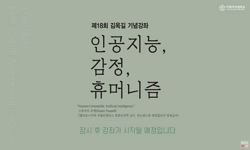Purpose: As a core technology of the 4th industrial revolution, artificial intelligence is rising as a crucial tech-nology for determining the competitiveness of nations and industries at a great pace. However, students who are not majoring in it have...
http://chineseinput.net/에서 pinyin(병음)방식으로 중국어를 변환할 수 있습니다.
변환된 중국어를 복사하여 사용하시면 됩니다.
- 中文 을 입력하시려면 zhongwen을 입력하시고 space를누르시면됩니다.
- 北京 을 입력하시려면 beijing을 입력하시고 space를 누르시면 됩니다.

The Effect of ARTIFICIAL INTELLIGENCE Literacy Education on University Students Ethical Consciousness of Artificial Intelligence
한글로보기부가정보
다국어 초록 (Multilingual Abstract)
Purpose: As a core technology of the 4th industrial revolution, artificial intelligence is rising as a crucial tech-nology for determining the competitiveness of nations and industries at a great pace. However, students who are not majoring in it have the tendency to perceive AI technology to be difficult, and hence, a more efficient AI edu-cation is needed. The purpose of this study is to present an educational program for the artificial intelligence liter-acy appropriate for the learner s level, apply it to the classroom, then explore its impact in terms of the artificial intelligence ethics. Method: In this study, an educational program for the artificial intelligence literacy which may be utilized for the non-majors using the tools of artificial intelligence has been designed. To analyze the impact of the educa-tional program conducted in this study on the learner s perception of the artificial intelligence ethics, the single group pre- and post-test which infers the causal relationship by implementing and analyzing the questionnaires on the changed perception of the artificial intelligence ethics before and after the application of the program was applied for the design method. Results: The impact of the education program for the artificial intelligence literacy on the perception of the arti-ficial intelligence ethics has been analyzed through the single group’s pre- and post-test by operating this pro-gram. As a result of the analysis, it has been verified that there was a positive change in the perception of the artificial intelligence ethics via the proposed educational program for the artificial intelligence literacy. Conclusion: In this study the impact of the educational program for the artificial intelligence literacy on the learner s perception of the artificial intelligence ethics has been analyzed by proposing and applying educational program for the artificial intelligence literacy for and in college and university liberal arts classes for the non-majors. The artificial intelligence literacy education has had a positive impact on the learner s perception of the artificial intelligence ethics. For the non-major students to fully comprehend the artificial intelligence, including the artificial intelligence ethics, an education which includes experience in the use of artificial intelligence ought to be offered beyond the classes of theory which merely convey knowledge, and towards this end, it was verified that a well structured artificial intelligence literacy education which can more than adequately offer the experiences of using and utilizing the artificial intelligence is necessary.
목차 (Table of Contents)
- 1. Introduction 2. Theoretical Background 3. Research Method 4. Research Findings and Discussions 5. Conclusion 6. References 7. Appendix
- 1. Introduction 2. Theoretical Background 3. Research Method 4. Research Findings and Discussions 5. Conclusion 6. References 7. Appendix
동일학술지(권/호) 다른 논문
-
- J-INSTITUTE
- Heungkweun Yang
- 2021
- KCI등재후보
-
- J-INSTITUTE
- Youngbae Kim
- 2021
- KCI등재후보
-
Multicultural Education of South Korea through the VIRTUAL REALITY
- J-INSTITUTE
- Seongran Ha
- 2021
- KCI등재후보
-
Impacts the SMARTPHONE Use on Adolescents’ Subjective Happiness in Korea
- J-INSTITUTE
- Bongmin Lee
- 2021
- KCI등재후보




 스콜라
스콜라






